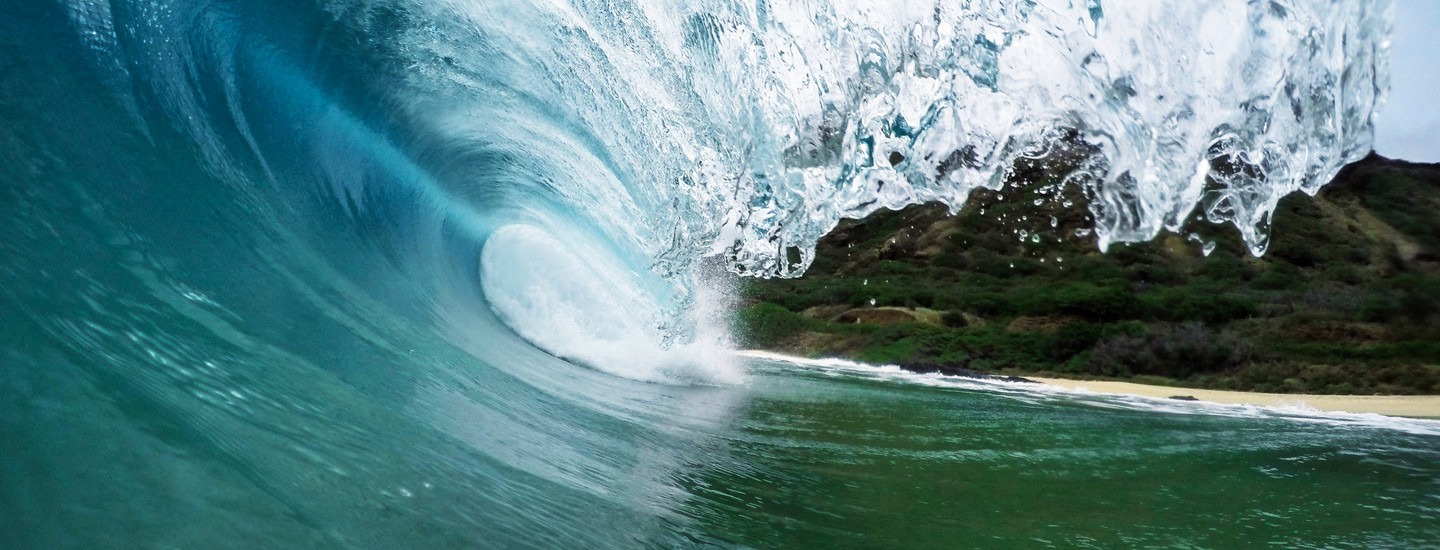
How we treat our freshwater resources on land affects water quality downstream at the local beach, lake, or river. A reduction in water quality can disrupt the health of the entire coastal ecosystem, harming plants, wildlife, and even our own health and wellness. Whether at home, at the beach or at work, it’s our responsibility to protect local water supplies and prevent pollution.
Although pollution comes from a whole range of sources, stormwater and urban runoff is the number one cause of beach closures and swim advisories in the US. This is because our natural landscapes are increasingly becoming developed into impermeable surfaces like roads, driveways, and buildings. Instead of landing on soil, rain falls on hard surfaces, and picks up all sorts of pollutants like oil, road dust, and lawn chemicals, before entering our storm drains and releasing directly into coastal waterways without any treatment. Other frequent sources of pollution include faulty sewage and septic systems, agricultural runoff, and discharges from factories and processing facilities. For more information on sources of water pollution, check out Beachapedia.
The Surfrider Foundation’s Clean Water Initiative provides ways you can help reduce, reuse, and recycle water at home and in your community so that we can safely enjoy our ocean, waves and beaches for years to come.
Don’t Waste Water Indoors.
By reducing the amount of water we send down our drains every day, we can cut down on the total amount of wastewater that we have to treat, and support properly functioning waste treatment systems. This is how conserving water in our homes helps to protect local water quality. Here are some easy ideas:
- Turn off the tap while you shave, brush your teeth or wash dishes.
- Install low-flow showerheads and toilets.
- Fix any leaky plumbing. A single leaky toilet can waste as much as 200 gallons of water per day.
- Do not flush any chemicals, pharmaceuticals or products containing plastics or microbeads down the drain or sink.
- Install a fast-acting water heater, and collect and reuse water released while waiting for water to heat.
Don’t Waste Water Outdoors.
Make your yard Ocean Friendly. Much of the rain that falls and irrigation we apply to our yards can end up wasted, running into the street, picking up pollution and bringing it into storm drains, creeks, and eventually the ocean. Stormwater and urban runoff are the number #1 cause of beach closures and swim advisories in coastal towns and cities across the country. Here’s how you can help:
- Replace thirsty turf grass with native plants that can survive under local rain conditions and don’t require synthetic fertilizers or chemicals.
- Apply compost and mulch to your garden and yard to help build healthy, living soil that can absorb rain and hold onto it for your plants’ use. Active soil microbes also help clean polluted waters and store carbon that plants absorb from the atmosphere.
- Direct rain gutters and downspouts into your landscaping to slow down and sponge up rain. This reduces flooding and keeps polluted runoff from reaching the ocean.
- Install a rain barrel to store rainwater for future irrigation needs, and make sure to direct the overflow into the landscape and not onto a driveway and out to a storm drain.
- Install a greywater system that recycles water from sinks, washing machines and the shower to irrigate landscaping.
- Scoop the Poop. A dime-sized piece of dog feces contains over 23 million fecal coliform bacteria. Pick up your pet’s droppings and encourage others to do the same.
- Sweep instead of using a hose. Cleaning your driveway and sidewalks with a hose sends dirty water into the storm drains and out to the beach.
- Don’t wash your car in the street or driveway. Take your car to the car wash instead to keep all that dirty and soapy water out of the street.
- Fix any oil or gas leaks in your car. Rain carries oil and other chemicals from our streets to the ocean and our beaches.
Check out Surfrider’s Ocean Friendly Gardens program for information on landscaping techniques to promote better quality at the beach. You can also learn more about what can be done by individuals and communities to stop wasting and polluting water by watching the Surfrider created film, The Cycle of Insanity: 2-minute trailer or full 20-minute film, and see below for a video of Surfrider’s Clean Water Team discussing the issues and ways to get involved.
